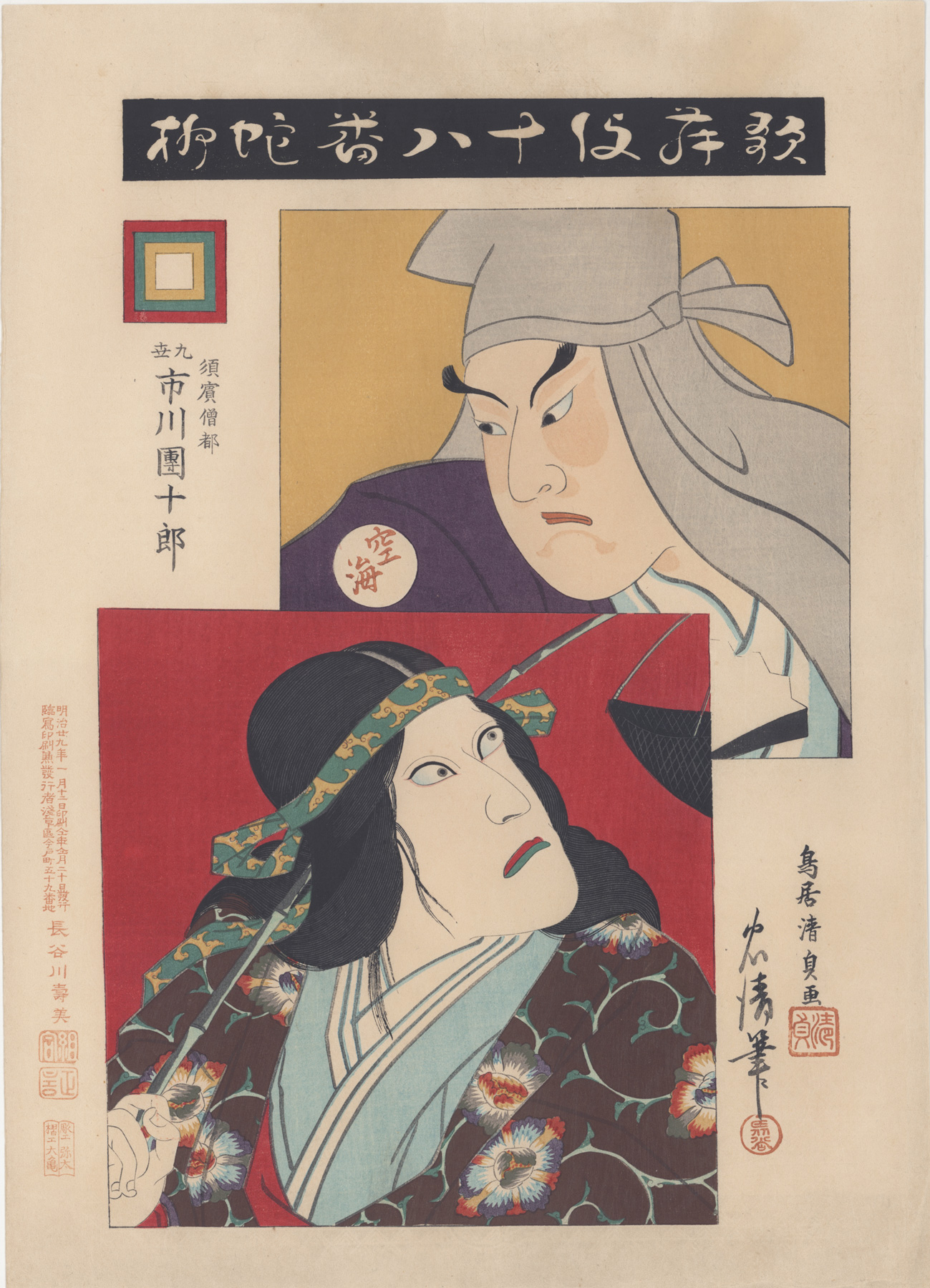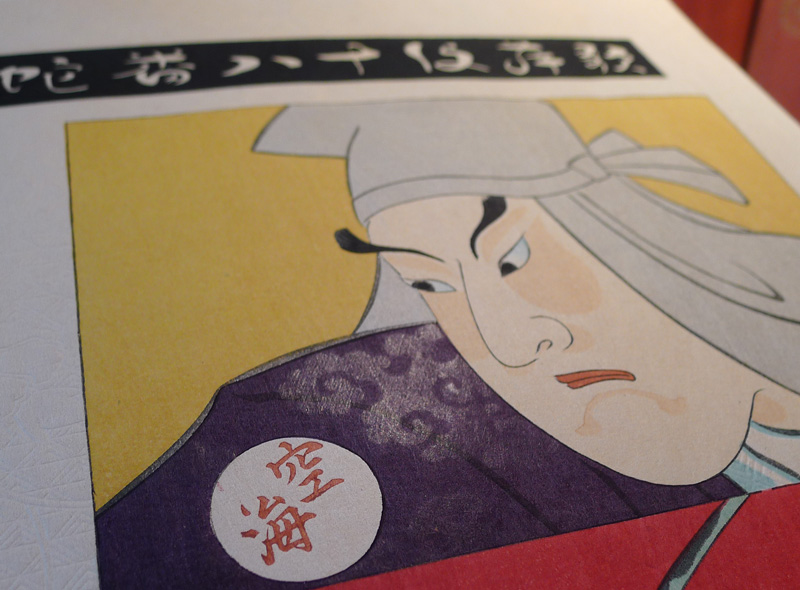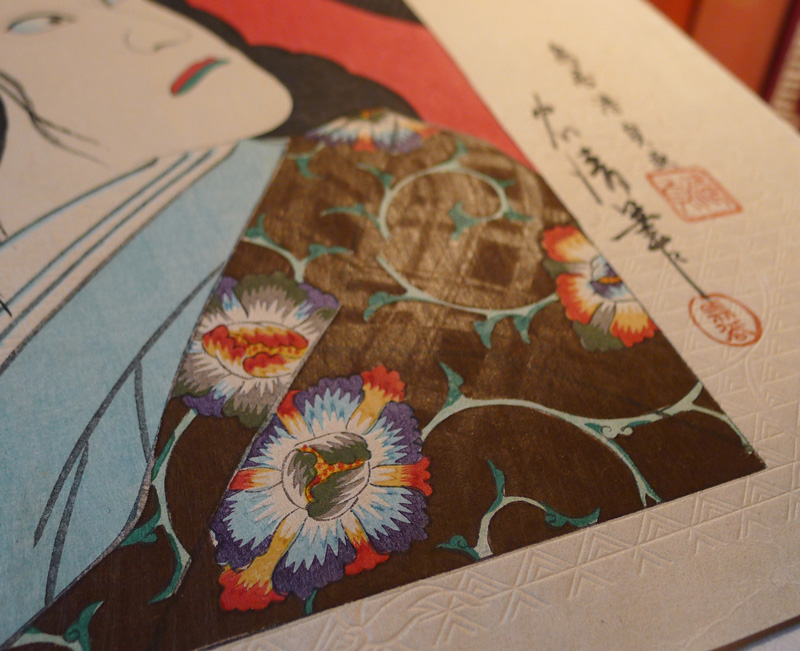About This Print
Ichikawa Danjūrō IX, in the lower left panel, playing the role of the spirit of the willow tree Suhama Sōzu in the kabuki play Jayanagi 蛇柳. Above his likeness is an unidentified actor in the role of (Kongō) Kūkai (空海 as seen on the purple robe), who is known by his posthumous name Kōbō Daishi. The Ichikawa family crest (mon) of nested squares is shown to the left of Danjūrō, beneath which appears 九世市川団十郎 (9th Generation, Ichikawa Danjūrō) and the character played 須宝僧都 (Suhama Sōzu.)While not visible in the above scan of this print, this print, as with others in the series, displays deluxe printing techniques, including embossing covering most of the prints background (a section of which can be seen under "Print Details, Signature" below) and the use of subtle patterns on the robes of Suhama Sōzu and (Kongō) Kūkai, visible only when held up to the light at a certain angle, as shown below.
click on image to enlarge
The Play Jayanagi (The Snake Willow)
Source: Kabuki Eighteen Traditional Dramas, Kawatake Toshio, Chronicle Books, 1985, p. 64."This play was written by Kanai Sanshō and was first performed in 1763 at the Nakamura-za in Edo as the third act of the drama called 'Momochidori Ōisogayoi' with Ichikawa Danjūrō IV.
Tanba no Suketarō, a village idiot is possessed by the angry spirit of a willow tree on Mt. Kōya (Kii Peninsula) and displays vehement jealousy. The text of this drama was lost so another theory is that Suketarō was possessed by the angry ghost of Kiyohime who was spurned by her lover, a Buddhist monk.
In 1947 Ichikawa Sanshō (Danjūrō X) and Kawajiri Seitan revived this act leaving in the spirit of a willow tree but adding the character of the famous Heike general, Kagekiyo."
The Kabuki Eighteen
Source: Kabuki Encyclopedia, An English-Language Adaption of Kabuki Jiten, Samuel L. Leiter, Greenwood Press, 1979, p. 152."The Kabuki Eighteen," a collection of plays established by Ichikawa Danjūrō VII, stresses the special aragoto acting art of the Danjūrō line. In the Meiji period other acting families began to gather their most successful plays into similar collections. See the Title Page from the series The Kabuki Eighteen (Kabuki Juhachiban) for a list of the plays.
Print Details
| IHL Catalog | #991 |
| Title or Description | Ichikawa Danjūrō IX as Suhama Sōzu in the play Jayanagi 九卋市川団十郎 須宝僧都 蛇柳 |
| Series | The Kabuki Eighteen (Kabuki Jūhachiban) 歌舞伎十八番 |
| Artist | Torii Kiyosada (1844-1901) and Torii Kiyotada VII (1875-1941) |
| Signature |  left-most signature: Tadakiyo hitsu 忠清筆 followed by Tadakiyo seal |
| Seal | as shown above: 清貞 Kiyosada seal right, beneath signature; Tadakiyo seal left, beneath signature |
| Publication Date | January 20, 1896 (Meiji 29) 明治二十九年一月二十日 |
| Publisher |  address: Tokyo Asakusa Imadochō 59-banchi |
| Engraver |  |
| Printer | 楷工大亀 Surikō Ōkame (see above cartouche) |
| Impression | good (minor mis-registration with embossed background) |
| Colors | excellent |
| Condition | good - not backed; light toning and soiling; minor handling creases |
| Genre | ukiyo-e; yakusha-e (役者絵) |
| Miscellaneous | embossing throughout |
| Format | vertical oban |
| H x W Paper | 15 1/4 x 10 3/4 in. (38.7 x 27.3 cm) |
| Literature | |
| Collections This Print | Museum of Fine Arts, Boston RES.53.13; Tokyo Metropolitan Library 5721-C008-18; Tsubouchi Memorial Theatre Museum of Waseda University 201-0140 and 201-0164 and 201-1050; Edo Tokyo Museum 94202528; National Gallery of Australia NGA 2015.577 |
10/17/2019




